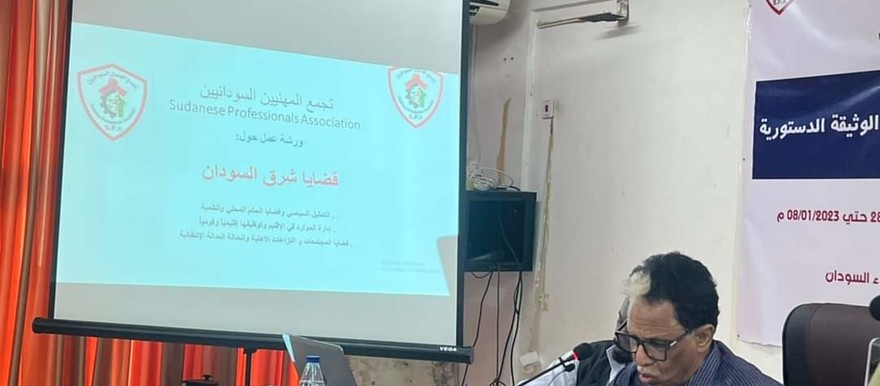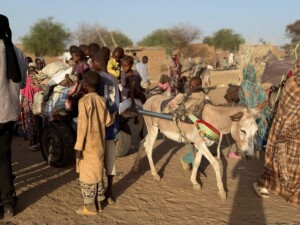SPA preparatory workshop on eastern Sudan concluded

The SPA workshop on governance issues in eastern Sudan on January 4 in Khartoum (social media)
A preparatory workshop on governance issues in eastern Sudan, organised by the Sudanese Professionals Association (SPA), concluded with several recommendations and discussed a “social reconciliation process”. The issue of eastern Sudan is one of the five outstanding ‘thorny’ issues that still require negotiations for the Final Agreement between an alliance of civilian forces and Sudan’s military junta.
The SPA is organising a series of workshops to prepare for the nation-wide dialogues on the five outstanding thorny issues that have to be agreed on with the military junta in order to start a new transitional period governed by a civilian government.
Governance issues in easter Sudan are one of the five outstanding issues, alongside issues concerned with justice and transitional justice, security and military reform, approaches to empowerment* removal, and possible amendments to the Juba Peace Agreement.
The SPA workshop series started on January 3 and a preparatory workshop on the issue of eastern Sudan was held on Wednesday,
The workshop concluded with recommendations on political representation, governance issues, resource management, community issues, civil conflicts, and justice and transitional justice.
According to the SPA, the recommendations are key to developing perceptions, visions, and plans to solve the crisis and the issue of the region.
In a press statement yesterday, the SPA reported “a wide participation of representatives of political, civil, and community groups and other actors and activists from the region”.
The workshop, which was divided into various working groups, also discussed “a social reconciliation process based on justice and transitional justice principles without any form of impunity”.
The workshop further dealt with defining the roles of native administration leaders in eastern Sudanese society.
Ibrahim Ismail, member of the Eastern Sudan High Council of Native Administration Leaders, told Radio Dabanga that “representatives of the SPA listened to the visions of the various social and political components of eastern Sudan”. They focussed on “issues of development, power, and wealth sharing”.
A workshop on the Juba Peace Agreement (JPA) and the required security and military reform is planned for Sunday, with the participation of JPA signatories and security and military leaders.
The issues of justice and transitional justice will also be discussed on the weekend.
Eastern Sudan
The governance issues in eastern Sudan have proven problematic in the past when they stalled negotiations.
The influential High Council of Beja Nazirs and Independent Chieftains itself witnessed a rift this summer when a faction opposed to Sayed Tirik made its own plans under the leadership of Abdallah Obshar and announced the formation of committees to prepare for the right to self-determination according to the stipulations of the Sinkat conference.
Ibrahim Adarob became the chair of the new split-off faction, Obshar the spokesperson. Obshar recently told Radio Dabanga that Adarob’s faction was invited by the Trilateral Mechanism to participate in the upcoming Final Agreement negotiations but refused after not being included in the previous stages.
Tirik himself also repeated his threat to announce self-determination for Red Sea state, Kassala, and El Gedaref, if the government in Khartoum does not respond to their demands for a separate platform on governance and development in eastern Sudan.
* Empowerment (tamkin) is the term with which the ousted government of Omar Al Bashir supported its affiliates by granting them far-going privileges, including government functions, the setting-up of various companies, and tax exemptions. An Empowerment Removal Committee (full name Committee for Dismantling the June 30 1989 Regime, Removal of Empowerment and Corruption, and Recovering Public Funds) was established by the government of Abdallah Hamdok at the end of 2019 with the aim to purge Sudan of the remnants of the Al Bashir regime. A number of its members were detained for a number of weeks following the military coup on October 25 last year.











 and then
and then